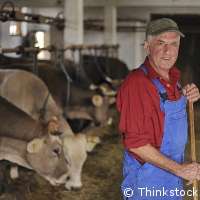Reducing the environmental impact of farms along the 'Atlantic Arc'

Livestock production in certain parts of Europe follows an intensive model which, while economically beneficial, is often damaging to the environment. Side effects of the intensive model of pig, poultry and cattle production include emissions of greenhouse gases (ammonia, nitrous oxide and methane) and soil and water pollution by nitrates.
The EU BATFARM ('Evaluation of Best Available Techniques to decrease air and water pollution in animal FARMs') project may soon be able to help farmers to reduce negative environmental impacts. As the project nears completion, the team is preparing to publish new, free software to help them select the best technologies and strategies in livestock waste handling.
The tool was developed following a detailed study to evaluate the effectiveness of technologies and practices used on livestock farms along the so-called 'Atlantic Arc'.
This 'arc' covers the western regions of Europe where poor soil often leads to intensified systems. The areas under examination by BATFARM are all remote areas with high tourist and cultural value where livestock production plays an important role the local economy. They also all share a particular vulnerability to pollution due to poor soils, hilly ground and relatively short river systems.
The BATFARM team visited farms across this 'Atlantic Arc' to evaluate in situ technologies and processes such as floor type in cattle housing, the use of additives in slurry storage, manure turning, flexible bags for collection and storage of slurry, gas bio-scrubber, slurry aeration and the incorporation of manure to soil.
The software that the project team has now developed will assess strategies to reduce the loss of nutrients, and the emissions of ammonia, methane and nitrous oxide from each of the different stages of production
The team has concluded that there is no one technology or management to recommend across the board, but that each farm must be looked at on a case by case basis. The software will help farmers to select the best farm waste technologies and practices to be applied according to the characteristics of their particular farm.
Ultimately, the aim of this software and indeed the entire BATFARM project is to reduce the environmental impact on the air, water and soil of technologies used on farms in the Atlantic Area.
More information: www.batfarm.eu/
Provided by CORDIS



















